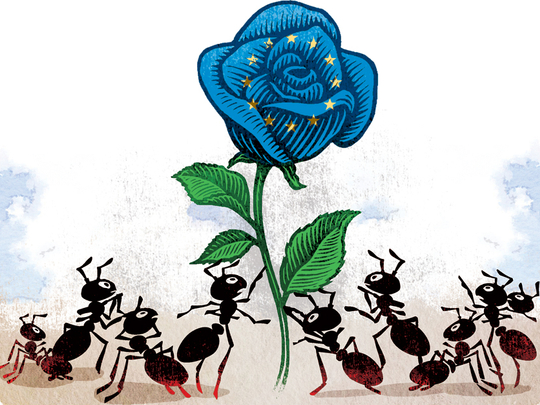
In Aberdeenshire, over 87 per cent of people voted in Scotland’s independence referendum; in Clackmannanshire, the number was above 88 per cent; in the Western Isles, it was close to 90 per cent. One remote Highland peninsula actually achieved a 100 per cent turnout — meaning that all 98 residents showed up to vote.
Overall, the number of Scots participating was an astonishing 84.6 per cent, more than 20 percentage points higher than at the last British general election. For a referendum that wasn’t supposed to be interesting, that wasn’t taken seriously in London, that wasn’t even much covered by the British media until the last few, frantic weeks, these are extraordinary numbers. In the end, the Kingdom remains United, Scotland will stay inside Britain, and that particular question is settled for a generation. But the turnout is a warning that beneath the surface, the political earth is moving, in Britain as everywhere else in Europe.
Supposedly, electorates across the continent were becoming apathetic, apolitical. It turns out that Europeans can be galvanised by politics, as long as politics offers something deeper: not a choice between marginally higher or lower taxes, not a debate about incremental changes to the welfare state but rather an existential choice, a debate about identity and a chance to overturn the establishment. The US has a long history of anti-Washington rhetoric, but this is really the first time we’ve heard anti-Westminster rhetoric of such power in the UK: against the Conservatives, against the Labour Party, and above all against London, a city that appears, from the perspective of the Highlands, to be controlled by unaccountable bankers and foreign oligarchs.
Most people date modern Scottish nationalism back to the days of Margaret Thatcher. But like Europe’s other anti-establishment movements, this one picked up speed thanks to the financial crisis of 2009, when Britain, like the rest of Europe, was suddenly hit by a financial hurricane that seemed to come from somewhere far away. Unpopular economic decisions made at the time were blamed on forces beyond Britain’s control.
The Scottish “Yes” campaign grew out of a popular demand to bring those forces back under control, to make decisions locally — and to defy the iron logic of global markets. At its utopian worst, the Scottish independence movement seemed to be promising more social spending without higher taxes, as if Scots could start from scratch and create a “better” country without paying any price for separation at all.
Mild promises
Still, these promises are mild compared to what the other anti-establishment parties of Europe are offering. With the exception of the Catalans, most of them don’t call for independence, but rather for national renewal as well as national control: of economics, of borders, of fate. Sometimes this takes the form of anti-immigration rhetoric, sometimes it’s anti-European Union or just anti-Germany. Most of them are on the political right: France’s National Front, Austria’s Freedom Party, Hungary’s Jobbik, Britain’s UK Independence Party.
Some of them are essentially anarchists, like the Italian party formed by the comedian Beppe Grillo. A few lie on the far left, but they are tied together by a political style that favours politically incorrect rhetoric, theatrical demonstrations, flags and sometimes music. In Scotland, it was bagpipes. In Hungary, the anti-establishment tunes are sung to the strains of heavy metal.
They are also linked by a dislike of their respective national elites. European voters have long been bored by the endless trade-offs between the centre-left and the centre-right — and in some countries decades of centre-left-right coalitions — and since the financial crisis seem to have lost faith in all of them. The ideals of European unity that inspired a previous generation don’t move younger people who have no memory of what came before. At the same time, it is increasingly and notably strange that the wealthiest group of nations on earth cannot create a policy to cope with the chaos rising on its southern and eastern borders — chaos that is of course the source of massive new immigration, as well as economic instability. Instead, distant EU institutions appear to fill their time making petty regulations. No wonder voters want to bring the decision-making “home.”
Some of the charges are unfair. Hated austerity policies were in fact forced upon many countries by their own past profligacy, not by “Europe.” It is also true that, as in Scotland, many of these new parties are inspired by unrealistic, backward-looking fantasies of separation, whether from Europe, from global markets, or from the world. But even if they are unfair or unrealistic, these are the passions that now move people. The political energy does not favour the status quo. Surely there are more earthquakes to come.
— Washington Post








